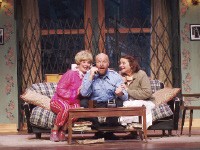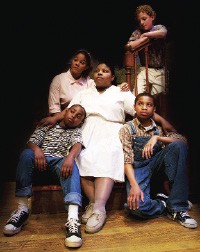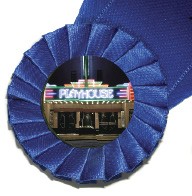Jim Ostrander, the man for whom Memphis’ annual theater awards are named, could do it all. His singing could fill the vacuum of space; his skills as a comedian were rivaled only by his skills as a tragedian. And although he was stoutly built, he could kick up his heels with the best dancers around. Ostrander’s laugh was famously large, and backstage lore held that you couldn’t have a bad show if he was in the audience. This year’s Ostrander nominations show that Memphis’ theaters are living up to the example set by their namesake: They can do anything.
Yes, musicals do dominate this year’s award season, but very few of them can be described as fluff. From the biting social commentary of Caroline, or Change, to the knowingly silly satire of The Musical of Musicals (The Musical!), these are complex artworks far removed from the escapist fare that defined America’s musical theater for most of the 20th century.
Theatre Memphis staged Steve Martin’s light absurdism with Picasso at the Lapin Agile, while Rhodes College tackled Samuel Beckett’s most famous monster, Waiting for Godot.
Shakespeare was well represented by an extraordinary (and underrecognized) production of Romeo and Juliet at Germantown Community Theatre, while Othello stalked the boards of Theatre Memphis’ Next Stage. Classic comedies like The Odd Couple were balanced by the grim realities of The Glory of Living and The Rabbit Hole.
Groups such as Playwright’s Forum and Our Own Voice supplied Memphis with numerous original works.
The 2006-’07 season has seen Memphis theaters tackle big issues relating to race, gender, and economic strife via scripts as diverse as Oleanna, The Full Monty, and Crumbs from the Table of Joy.
It short, it has been a good year for Memphis theater, and on Sunday, August 26th, Contemporary Media (parent company of the Flyer) and the Greater Memphis Arts Council will celebrate the best of the best when the Ostrander Community Theatre Awards get under way at the Memphis Botanic Garden. Cocktails are served at 6 p.m. The ceremony begins at 7:30 p.m.
Ostrander Community Theatre Awards
Nominees for 2006-2007
Key: TM=Theatre Memphis, NSTM=Next Stage at Theatre Memphis, POTS=Playhouse on the Square, CP=Circuit Playhouse, GCT=Germantown Community Theatre, HT=Harrell Theatre, POTSTW=Playhouse on the Square at TheatreWorks.
SET DESIGN: Christopher McCollum for Picasso at the Lapin Agile at NSTM; Bruce Bergner for Seussical at POTS; Christopher McCollum for The Odd Couple at TM; Jimmy Humphries for The Rabbit Hole at CP; Pam Hurley for Little Shop of Horrors at TM.
COSTUMES: Rebecca Powell for 
The Rabbit Hole at Circuit Playhouse
Seussical at POTS; Andre Bruce Ward for My Fair Lady at TM; Jason Bishop for The Wild Party at CP; Janice Louise for Picasso at the Lapin Agile at NSTM; Rebecca Powell for The Mousetrap at POTS.
LIGHTING: Jared Land for Little Shop of Horrors at TM; Ben Wheeler for Seussical at POTS; Matthew Landwehr for The Rabbit Hole at CP; Ken Friedhoff for The Full Monty at POTS; Ben Wheeler for Cat on a Hot Tin Roof at POTS.
PROPS: David Nofsinger and Bill Short for My Fair Lady at TM; Carey Stipe for I Am My Own Wife at CP; Bill Short for It’s a Wonderful Life: A Live Radio Play at POTS.
SET DRESSING: Bill Short for It’s a Wonderful Life: A Radio Play at POTS; Carey Stipe for I Am My Own Wife at CP; Christopher McCollum for Picasso at the Lapin Agile at NSTM; Dave Nofsinger and Bill Short for My Fair Lady at TM.
MUSIC DIRECTION: Angelo Rapan for Little Shop of Horrors at TM; Angelo Rapan for Evita at HT; Dennis Whitehead for The Wild Party at CP; Dennis Whitehead for The Full Monty at POTS; Gary Beard for Musical of Musicals at NSTM.
SOUND DESIGN: Eric Sefton for Romeo and Juliet at GCT; Rory Dale for I Am My Own Wife at CP; Rory Dale for The Rabbit Hole at CP; Steven Gary for Oleanna at NSTM; Rory Dale for The Glory of Living at CP.
CHOREOGRAPHY: David Ollington for The Full Monty at POTS; Amy Hanford for Evita at HT; Jerre Dye for Little Shop of Horrors at TM; Pam Hurley for Musical of Musicals at NSTM; Jay Rapp for The Wild Party at CP.

The House of Blue Leaves at Theatre Memphis
SUPPORTING ACTRESS IN A MUSICAL: Shaheerah Farrakhan for Caroline, or Change at POTS; Irene Crist for The Full Monty at POTS; Cheyenne Nelson for The Wild Party at CP; Sheana Tobey for The Wild Party at CP; Crystin Gilmore for Caroline, or Change at POTS.
SUPPORTING ACTOR IN A MUSICAL: Kent Fleshman for Little Shop of Horrors at TM; Greg Pragel for The Full Monty at POTS; Daniel Zakarija for The Full Monty at POTS; Jeremy Garrett for Big River at POTS; John Hemphill for Big River at POTS.
LEADING ACTRESS IN A MUSICAL: Illeana Kirven for Caroline, or Change at POTS; Emily Pettet for Beauty and the Beast at HT; Miriam Rodriguez for Little Shop of Horrors at TM; Kim Baker for Seussical at POTS; Jude Knight for Musical of Musicals at NSTM.
LEADING ACTOR IN A MUSICAL: Marques Brown for Little Shop of Horrors at TM; Aaron Lamb for The Full Monty at POTS; Andrew Weir for Big River at POTS; Pete Montgomery for Seussical at POTS; Kent Fleshman for Musical of Musicals at NSTM.
DIRECTION OF A MUSICAL: Dave Landis for Caroline, or Change at POTS; Cecelia Wingate for Little Shop of Horrors at TM; Bennett Wood for Musical of Musicals at TM; Gary John La Rosa for Seussical at POTS; Dave Landis for The Full Monty at POTS.
MUSICAL PRODUCTION: Caroline, or Change at POTS; The Full Monty at POTS; Seussical at POTS; Little Shop of Horrors at TM; Musical of Musicals at NSTM.
SUPPORTING ACTRESS IN A DRAMA: Alicia Queen for Othello at NSTM; Erin Shelton for Crumbs From the Table of Joy at CP; Jo Lynne Palmer for The Exonerated at POTSTW; Irene Crist for The Rabbit Hole at CP; Maya Geri for Crumbs From the Table of Joy at CP.
SUPPORTING ACTOR IN A DRAMA: Tony Isbell for Picasso at the Lapin Agile at NSTM; Jim Palmer for The Pillowman at POTSTW; Aaron Lamb for The Pillowman at POTSTW; Ed Porter for The Rabbit Hole at CP; Barry Fuller for Picasso at the Lapin Agile at NSTM.
LEADING ACTRESS IN A DRAMA: Kim Justis Eikner for The Rabbit Hole at CP; Erin McGhee for The Glory of Living at POTS; Kristi Steele for Crumbs From the Table of Joy at CP; Erin Shelton for Othello at NSTM.
Caroline, or Change at Playhouse on the Square
LEADING ACTOR IN A DRAMA: Michael Khanlarian for Othello at NSTM; Kyle Hatley for Picasso at the Lapin Agile at NSTM; Barclay Roberts for The House of Blue Leaves at Theatre Memphis; Marques Brown for Picasso at the Lapin Agile at NSTM; Michael Gravois for I Am My Own Wife at CP; Michael Gravois for The Pillowman at POTSTW.
DIRECTION OF A DRAMA: Stephen Hancock for I Am My Own Wife at CP; Stephen Hancock for The Pillowman at POTSTW; Tony Horne for Crumbs From the Table of Joy at CP; Dave Landis for The Rabbit Hole at CP.
DRAMATIC PRODUCTION: The Pillowman at POTSTW; Picasso at the Lapin Agile at NSTM; Crumbs From the Table of Joy at CP; I Am My Own Wife at CP; The Rabbit Hole at CP.
ENSEMBLE ACTING: Cast of Musical of Musicals at NSTM; cast of Crumbs From the Table of Joy at CP.
BEHIND THE SCENES AWARD: Michael Compton at TM; Rory Dale at POTS; Betty Dilley at GCT.
EUGART YERIAN AWARD FOR LIFETIME SERVICE TO MEMPHIS THEATRE: Julia “Cookie” Ewing.
College Ostrander Awards
Nominees for 2006-2007
Key: U of M=The University of Memphis, Rhodes=The McCoy Theatre at Rhodes College
EXCELLENCE IN SET DESIGN: Laura Canon for Waiting for Godot at Rhodes; Michael Jones for Elegies at U of M; Douglas Gilpin for Noises Off at U of M.
EXCELLENCE IN LIGHTING: J.D. Sargent for The Last Days of Judas Iscariot at U of M; Laura Canon for Waiting for Godot at Rhodes; Ken Friedhoff for Elegies at U of M.
CHOREOGRAPHY, STAGE COMBAT: Susan Chrietzberg for As You Like It at the U of M; Jerre Dye for Dancing at Lughnasa at Rhodes; Susan Chrietzberg for Noises Off at the U of M.
LEADING ACTRESS IN A MUSICAL: Claire Hayner for Elegies at the U of M; Annie Freres for Elegies at U of M; Kirie Taylor Walz for Elegies at U of M.
LEADING ACTOR IN A MUSICAL: Kevin Todd Murphy for Elegies at U of M; Ryan Scott for Elegies at U of M.
SUPPORTING ACTRESS IN A DRAMA: Jade Hobbs for As You Like It at U of M; Shannon King for Dancing at Lughnasa at Rhodes; Alicia Queen for Agnes of God at Rhodes.
SUPPORTING ACTOR IN A DRAMA: Thomas Kelly for Waiting for Godot at Rhodes; Daniel Sturtevant for Waiting for Godot at Rhodes; Matthew Crewse for As You Like It at U of M.
LEADING ACTRESS IN A DRAMA: Alicia Queen for Dancing at Lughnasa at Rhodes; Ann Marie Gideon for As You Like It at U of M.
LEADING ACTOR IN A DRAMA: Jason Hansen for Waiting for Godot at Rhodes; Michael Frame for Noises Off at U of M; Nate Smith for Waiting for Godot at Rhodes; Pete Montgomery for Dancing at Lughnasa at Rhodes.
ENSEMBLE ACTING: Cast of Elegies at U of M; cast of Waiting for Godot at Rhodes; cast of Dancing at Lughnasa at Rhodes.
DIRECTION OF A DRAMA: Jerre Dye for Dancing at Lughnasa at Rhodes; Pamela Poletti for Waiting For Godot at Rhodes; Stephen Hancock for Noises Off at U of M.
DRAMATIC PRODUCTION: Waiting for Godot at Rhodes; Dancing at Lughnasa at Rhodes.
 Justin Fox Burks
Justin Fox Burks  Justin Fox Burks
Justin Fox Burks  Justin Fox Burks
Justin Fox Burks  Justin Fox Burks
Justin Fox Burks  Justin Fox Burks
Justin Fox Burks 

